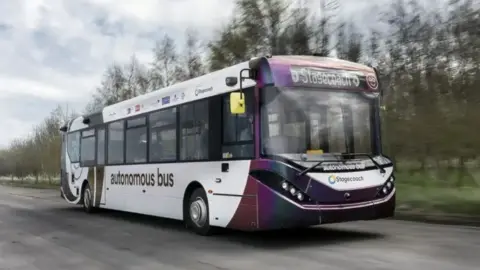'World first' driverless bus service to be dropped
 PA Media
PA MediaA driverless bus service thought to be the first of its kind in the world is to be pulled because of a lack of passengers.
CAVForth has operated the full-size, self-driving buses between Fife and Edinburgh on the Stagecoach timetable since May 2023, with an estimated capacity of 10,000 passengers a week.
Five single-decker vehicles, which required two drivers on board even when operating autonomously, have been making the 14-mile journey between Ferrytoll park and ride in Fife and Edinburgh Park train and tram interchange.
However, the company said "passenger adoption" on the government-funded pilot project "did not meet expectations" and it would end in February 2025.
CAVForth is a collaboration between Fusion Processing Limited, Alexander Dennis, Edinburgh Napier University and the University of the West of England.
It was estimated to cost £6.1m, with more than two-thirds of that coming from the UK government's £100m Intelligent Mobility Fund with other investment from bus operator Stagecoach, Transport Scotland, and industry partners.
Their driverless buses have sensors enabling them to travel on pre-selected roads at up to 50mph.
On each trip they switch between autonomous and manual driving, being controlled by computer across the Forth Road Bridge, and from the M90 and M8 to the A720 in Edinburgh.
A "safety driver" remains in the driver's seat to monitor the technology even when the computer is controlling the bus, and a "bus captain" helps passengers with boarding, buying tickets and queries.
 PA Media
PA MediaA spokesperson for CAVForth said they were "proud to have achieved a world first" and to have demonstrated the "potential for self-driving technology on a real-world registered timetable".
"This groundbreaking trial project has delivered invaluable insights, with partners working together to shape the future of public transport," they said in a statement.
"Although passenger adoption on the AB1 route did not meet expectations, the trial has significantly advanced the understanding of the operational and regulatory requirements for autonomous services, delivering what was expected from this demonstrator project."
It added that the project partners would explore new opportunities for self-driving technology in other parts of the UK.
